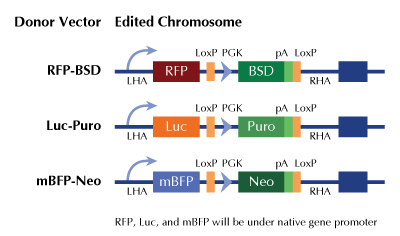PTPRU Human Gene Knockout Kit (CRISPR)
CAT#: KN214198LP
PTPRU - human gene knockout kit via CRISPR, HDR mediated
HDR-mediated knockout kit validation
CNY 12,260.00
Specifications
| Product Data | |
| Format | 2 gRNA vectors, 1 Luciferase-Puro donor, 1 scramble control |
| Donor DNA | Luciferase-Puro |
| Symbol | PTPRU |
| Locus ID | 10076 |
| Kit Components |
KN214198G1, PTPRU gRNA vector 1 in pCas-Guide CRISPR vector KN214198G2, PTPRU gRNA vector 2 in pCas-Guide CRISPR vector KN214198LP-D, donor DNA containing left and right homologous arms and Luciferase-Puro functional cassette. GE100003, scramble sequence in pCas-Guide vector |
| Disclaimer | These products are manufactured and supplied by OriGene under license from ERS. The kit is designed based on the best knowledge of CRISPR technology. The system has been functionally validated for knocking-in the cassette downstream the native promoter. The efficiency of the knock-out varies due to the nature of the biology and the complexity of the experimental process. |
| Reference Data | |
| RefSeq | NM_001195001, NM_005704, NM_133177, NM_133178 |
| Synonyms | FMI; hPTP-J; PCP-2; PTP; PTP-J; PTP-PI; PTP-RO; PTPPSI; PTPRO; PTPU2; R-PTP-PSI; R-PTP-U |
| Summary | The protein encoded by this gene is a member of the protein tyrosine phosphatase (PTP) family. PTPs are known to be signaling molecules that regulate a variety of cellular processes including cell growth, differentiation, mitotic cycle, and oncogenic transformation. This PTP possesses an extracellular region, a single transmembrane region, and two tandem intracellular catalytic domains, and thus represents a receptor-type PTP. The extracellular region contains a meprin-A5 antigen-PTP (MAM) domain, Ig-like and fibronectin type III-like repeats. This PTP was thought to play roles in cell-cell recognition and adhesion. Studies of the similar gene in mice suggested the role of this PTP in early neural development. The expression of this gene was reported to be regulated by phorbol myristate acetate (PMA) or calcium ionophore in Jurkat T lymphoma cells. Alternatively spliced transcript variants have been reported. [provided by RefSeq, Aug 2010] |
Documents
| Product Manuals |
| FAQs |
Resources
| 基因表达相关资源 |
Other Versions
| SKU | Description | Size | Price |
|---|---|---|---|
| KN214198 | PTPRU - human gene knockout kit via CRISPR, HDR mediated |
CNY 12,260.00 |
|
| KN214198BN | PTPRU - human gene knockout kit via CRISPR, HDR mediated |
CNY 12,260.00 |
|
| KN214198RB | PTPRU - human gene knockout kit via CRISPR, HDR mediated |
CNY 12,260.00 |
|
| KN414198 | PTPRU - KN2.0, Human gene knockout kit via CRISPR, non-homology mediated. |
CNY 8,680.00 |
|
| GA106829 | PTPRU CRISPRa kit - CRISPR gene activation of human protein tyrosine phosphatase receptor type U |
CNY 12,255.00 |


 United States
United States
 Germany
Germany
 Japan
Japan
 United Kingdom
United Kingdom
 China
China

